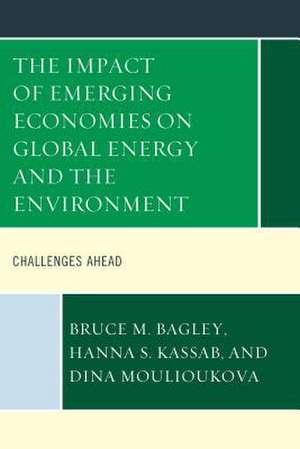The Impact of Emerging Economies on Global Energy and the Environment
en Limba Engleză Hardback – 7 noi 2015
Preț: 793.77 lei
Preț vechi: 1087.36 lei
-27% Nou
Puncte Express: 1191
Preț estimativ în valută:
151.88€ • 158.58$ • 125.71£
151.88€ • 158.58$ • 125.71£
Carte tipărită la comandă
Livrare economică 05-19 aprilie
Preluare comenzi: 021 569.72.76
Specificații
ISBN-13: 9781498519113
ISBN-10: 1498519113
Pagini: 356
Ilustrații: 4 maps, 4 charts, 21 tables, 19 graphs
Dimensiuni: 150 x 231 x 33 mm
Greutate: 0.64 kg
Editura: Rowman & Littlefield
ISBN-10: 1498519113
Pagini: 356
Ilustrații: 4 maps, 4 charts, 21 tables, 19 graphs
Dimensiuni: 150 x 231 x 33 mm
Greutate: 0.64 kg
Editura: Rowman & Littlefield
Notă biografică
Cuprins
Preface: Louise Léger
Introduction: Bruce Bagley, Dina Moulioukova and Hanna Samir Kassab
Part 1: Energy and the Global System
Chapter 1: Domestic and International Implications of Energy Revolution in North America Edward Glab (Florida International University)
Chapter 2: Canada- US and the Global Energy Markets in the 21st Century Harrie Vredenburg (University of Calgary)
Chapter 3: The European Union Energy Security and Economic Growth in the 21st Century Maxime Larive (University of Miami)
Chapter 4: Chinäs Role in Latin American Energy Development Wenyan Wu (University of Miami)
Part 2: Energy and Emerging Economics in the 21st Century
Chapter 5: Russia in the International System Roger Kanet and Dina Moulioukova (University of Miami)
Chapter 6: Chinese Energy Policy in Latin America: The Case of Ecuador Nashira Chavez (University of Miami)
Chapter 7: Energy, Economic Growth and the Role of India in the Global Economic System Diana Soller (University of Miami)
Chapter 8: Domestic Constraints on Brazil's Role as Regional and Global Energy Power Marcelo Zorovich (University of Miami)
Part 3: Energy production, Technological Development and Environmental Sustainability in the 21st Century
Chapter 9: The Promise of Shale Gas in the Americas Eric Farnsworth (Council of the Americas and the Americas Society)
Chapter 10: Energy Security, Economic Development and Environmental Sustainability in the 21st Century in Latin America
Bruce Bagley (University of Miami)
Chapter 11: Venezuelan Regime Change and Oil Exports in the Western Hemisphere Gonzalo Vazquez (University of Miami)
Chapter 12: On Colombia Oil Chris Kraul (Freelance Writer)
Chapter 13: Energy production and armed conflict in Colombia: Present and future economic and environmental implications Lilian Yaffe (University of Miami)
Part 4: Hydrocarbons vs. Renewables in the Future of Global Energy Production
Chapter 14: Energy and Systemic Change: The Rising Power of Coal Hanna Samir Kassab (University of Miami)
Chapter 15: Russian Re-Engagement with Latin America: Energy and Beyond Vladimir Rouvinski (ICESI University)
Chapter 16: Brazilian Energy Production, Renewables and Economic Growth in Brazil John Twichell (University of Miami)
Concluding Remarks- Bruce Bagley, Dina Moulioukova and Hanna Samir Kassab
Descriere
This volume focuses on the impacts of the BRICS nations on world energy markets. In the analyses presented here, a variety of factors, such as national patterns of production and consumption, international energy trade, and the extent to which alternative and competing policies maintain or bring about change in the international order, are examined.
